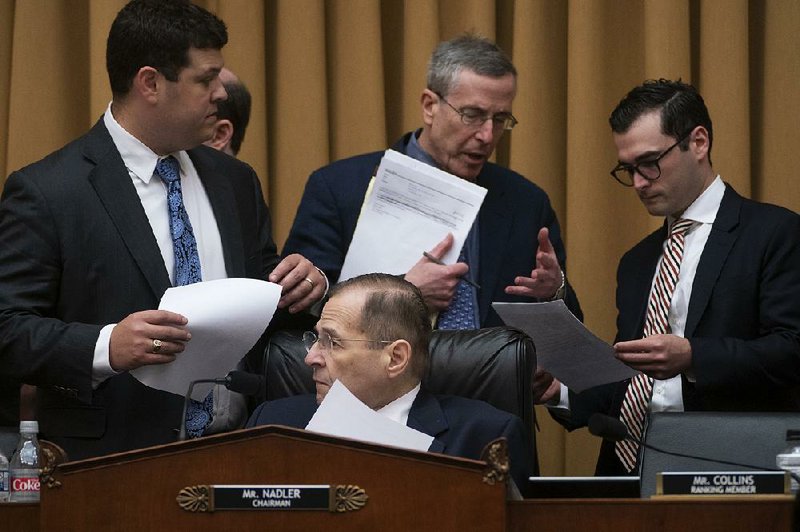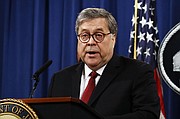WASHINGTON -- The House Judiciary Committee voted along party lines Wednesday to hold Attorney General William Barr in contempt of Congress for failing to turn over Robert Mueller's unredacted report, hours after President Donald Trump asserted executive privilege to shield the full report and underlying evidence from public view.
The committee's 24-16 contempt vote, taken after hours of debate, marked the first time that the House has taken official action to punish a government official or witness amid a standoff between the legislative and executive branch. The Justice Department called it an unnecessary and overwrought reaction designed to stoke a fight.
The vote raised the stakes in an increasingly tense battle over evidence and witnesses as Democrats investigate Trump and his administration.
"Our fight is not just about the Mueller Report -- although we must have access to the Mueller report. Our fight is about defending the rights of Congress, as an independent branch, to hold the president, any president, accountable," Rep. Jerrold Nadler, D-N.Y., the Judiciary Committee chairman, said during the debate.
Justice Department spokesman Kerri Kupec said it was disappointing that members of Congress "have chosen to engage in such inappropriate political theatrics."
Barr made "extraordinary efforts" to provide Congress and the public with information about Mueller's work, she said.
The executive privilege assertion was Trump's first use of the secrecy powers as president. The Justice Department described it as "protective" to allow Trump time to fully review the materials to make a final privilege determination.
At the White House, press secretary Sarah Huckabee Sanders defended the decision in a Wednesday morning statement.
"The American people see through Chairman Nadler's desperate ploy to distract from the president's historically successful agenda and our booming economy," she said in a statement. "Neither the White House nor Attorney General Barr will comply with Chairman Nadler's unlawful and reckless demands."
If the full House follows the committee's recommendation, it would be only the second time in American history that the nation's top law enforcement official is found to be in contempt of Congress. It was not immediately clear when such a vote would occur, and the intervening period could allow Barr time to negotiate a compromise.
In a letter Wednesday to Trump, Barr explained that the special counsel's files contain millions of pages of classified and unclassified information. He said it was the committee's "abrupt resort to a contempt vote" that "has not allowed sufficient time for you to consider fully whether to make a conclusive assertion of executive privilege."
Barr told Trump that he should assert privilege now, "pending a full decision on the matter."
Barr released a redacted version of the special counsel's 448-page report voluntarily last month. But Democrats say that is not good enough, and they have accused the attorney general of stonewalling a legitimate request, and then subpoena for, material, including secretive grand jury information and other evidence, that they say they need to carry out an investigation into possible obstruction of justice and abuse of power by Trump.
Lawmakers convened Wednesday morning to formally draft and vote on the committee's 27-page contempt report. The document lays out the committee's need for the report and offers an accounting of attempts to get Barr to share the materials first voluntarily and then under subpoena.
"Although the committee has attempted to engage in accommodations with Attorney General Barr for several months, it can no longer afford to delay, and must resort to contempt proceedings," the report reads.
The Justice Department had tried to stave off the committee vote, offering to lawmakers some concessions around a less redacted version of the Mueller report that Democrats ultimately deemed insufficient.
Stephen Boyd, the Justice Department's top congressional liaison, said in a letter to Nadler that complying with the subpoena would require the department to violate "the law, court rules, and court orders" as well as grand jury secrecy rules. Republicans in the Judiciary Committee hearing room returned to that point again and again as they accused Democrats of putting Barr in an untenable situation of choosing between their subpoena and the law.
Democrats said they did not expect Barr to break the law and unilaterally release grand jury secrets. Rather, they said they had repeatedly asked him to join the committee in petitioning a judge to unseal material for the grand jury for committee use. He refused. Democrats agreed to an amendment from Rep. Matt Gaetz, R-Fla., that clarified that the committee did not expect Barr to break the law and unilaterally release the grand jury material.
Democrats say the president lost his opportunity to claim executive privilege, since much of the report and evidence have either been released publicly or shared with lawyers in the special counsel case.
Still, Trump's invoking of privilege for the first time as president could tie up the material in court and significantly complicate Democrats' efforts to call other witnesses. It could limit testimony by Donald McGahn, a former White House counsel and key witness in the special counsel's investigation, scheduled under subpoena for May 21. Nadler said Wednesday that it could also delay a potential hearing with Mueller in the Judiciary Committee.
"I think the president will try to stop Robert Mueller. Whether he will succeed is another question," Nadler said.
A Justice Department official said the assertion of executive privilege Wednesday has "no direct bearing on Special Counsel Mueller's testimony," the date and terms of which are still being discussed. But the move could limit what Mueller can say indirectly, by putting particular subject areas off limits.
There is little precedent for holding an attorney general, or any Cabinet-level official, in contempt. House Republicans did it for the first time in 2012, when they held Attorney General Eric Holder in contempt in connection with requests for information about the botched "Fast and Furious" gun trafficking investigation. Republicans cited that case Wednesday, saying they had waited hundreds of days before escalating their fight over documents to a contempt citation. Democrats waited just a few weeks in the case of Barr.
"Why this rush?" asked Rep. Doug Collins of Georgia, the top Republican on the committee. "Without any valid legislative or administrative reason, we can only assume Democrats, led by the chairman, have resolved to sully Bill Barr's good name and reputation."
Rep. Ted Deutch, D-Fla., called the administration's stonewalling "the definition of a constitutional crisis."
Hours before the vote, House Speaker Nancy Pelosi, D-Calif., said Trump is "becoming self-impeachable," pointing to his efforts to fight all subpoenas from congressional investigations and prevent key aides from testifying before Congress.
"The point is that every single day, whether it's obstruction, obstruction, obstruction -- obstruction of having people come to the table with facts, ignoring subpoenas ... every single day, the president is making a case -- he's becoming self-impeachable, in terms of some of the things that he is doing," Pelosi said at a Washington Post Live event.
It was not immediately clear what Pelosi meant by "self-impeachable." The House speaker has thus far resisted calls by some members of her party to pursue impeachment proceedings against Trump.
Information for this article was contributed by Nicholas Fandos of The New York Times; by Rachael Bade, Carol D. Leonnig, Matt Zapotosky and Felicia Sonmez of The Washington Post; and by Mary Clare Jalonick, Lisa Mascaro, Jonathan Lemire, Mike Balsamo and Laurie Kellman of The Associated Press.
A Section on 05/09/2019



